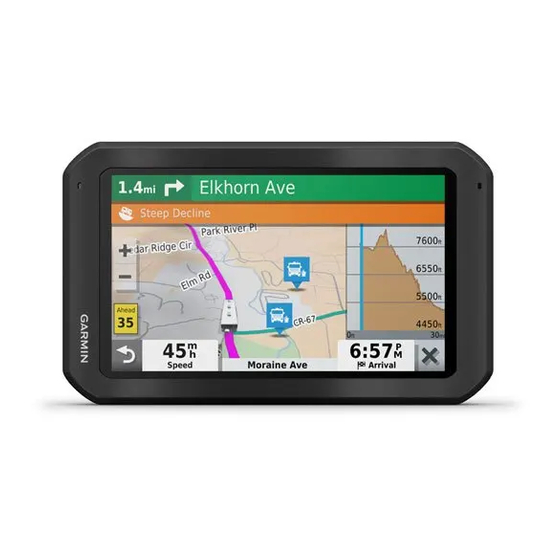Garmin VIEO RV 851 Benutzerhandbuch - Seite 10
Blättern Sie online oder laden Sie pdf Benutzerhandbuch für Auto-Navigationssystem Garmin VIEO RV 851 herunter. Garmin VIEO RV 851 38 Seiten.
Auch für Garmin VIEO RV 851: Schnellstart-Handbuch (25 seiten)

Starting a Route
1
Select
, and search for a location
Locations, page
6).
2
Select a location.
3
Select an option:
• To start navigating using the recommended route, select
Go!.
• To choose an alternate route, select , and select a route.
Alternate routes appear to the right of the map.
• To edit the course of the route, select
add shaping points to the route.
The device calculates a route to the location and guides you
using voice prompts and information on the map
the Map, page
4). A preview of the major roads in your route
appears at the edge of the map for several seconds.
If you need to stop at additional destinations, you can add the
locations to your route
(Adding a Location to Your Route,
page
4).
Starting a Route by Using the Map
You can start route by selecting a location from the map.
1
Select View Map.
2
Drag and zoom the map to display the area to search.
3
If necessary, select
to filter the displayed points of interest
by category.
Location markers ( or a blue dot) appear on the map.
4
Select an option:
• Select a location marker.
• Select a point, such as a street, intersection, or address
location.
5
Select Go!.
Going Home
The first time you start a route home, the device prompts you to
enter your home location.
1
Select
> Go Home.
2
If necessary, enter your home location.
Editing Your Home Location
1
Select
>
> Set Home Location.
2
Enter your home location.
Your Route on the Map
As you travel, the device guides you to your destination using
voice prompts and information on the map. Instructions for your
next turn or exit, or other actions appear across the top of the
map.
4
(Finding and Saving
> Edit Route, and
(Your Route on
Distance to the next action.
Next action in the route. Indicates the next turn, exit, or other action
and the lane in which you should travel, if available.
Name of the street or exit associated with the next action.
Route highlighted on the map.
Next action in the route. Arrows on the map indicate the location of
upcoming actions.
Map tool shortcuts.
Map tools. You can select the tools to show you more information
about your route and surroundings.
Data fields.
TIP: You can touch these fields to change the information they
show
(Changing the Map Data Field, page
Vehicle speed.
Active Lane Guidance
As you approach some turns, exits, or interchanges in your
route, a detailed simulation of the road appears beside the map,
if available. A colored line
turn.
Viewing Turns and Directions
While navigating a route, you can view upcoming turns, lane
changes, or other directions for your route.
1
From the map, select an option:
• To view upcoming turns and directions as you navigate,
select > Turns.
The map tool displays the next four turns or directions
beside the map. The list updates automatically as you
navigate the route.
• To view the complete list of turns and directions for the
entire route, select the text bar at the top of the map.
2
Select a turn or direction (optional).
Detailed information appears. An image of the junction may
appear for junctions on major roadways, if available.
Viewing the Entire Route on the Map
1
While navigating a route, select anywhere on the map.
2
Select
.
Arriving at Your Destination
When you approach your destination, the device provides
information to help you complete your route.
•
indicates the location of your destination on the map, and a
voice prompt announces you are approaching your
destination.
• When you stop at your destination, the device automatically
ends the route. If the device does not detect your arrival
automatically, you can select Stop to end your route.
Changing Your Active Route
Adding a Location to Your Route
Before you can add a location to your route, you must be
navigating a route
(Starting a Route, page
10).
indicates the proper lane for the
4).
Navigating to Your Destination
